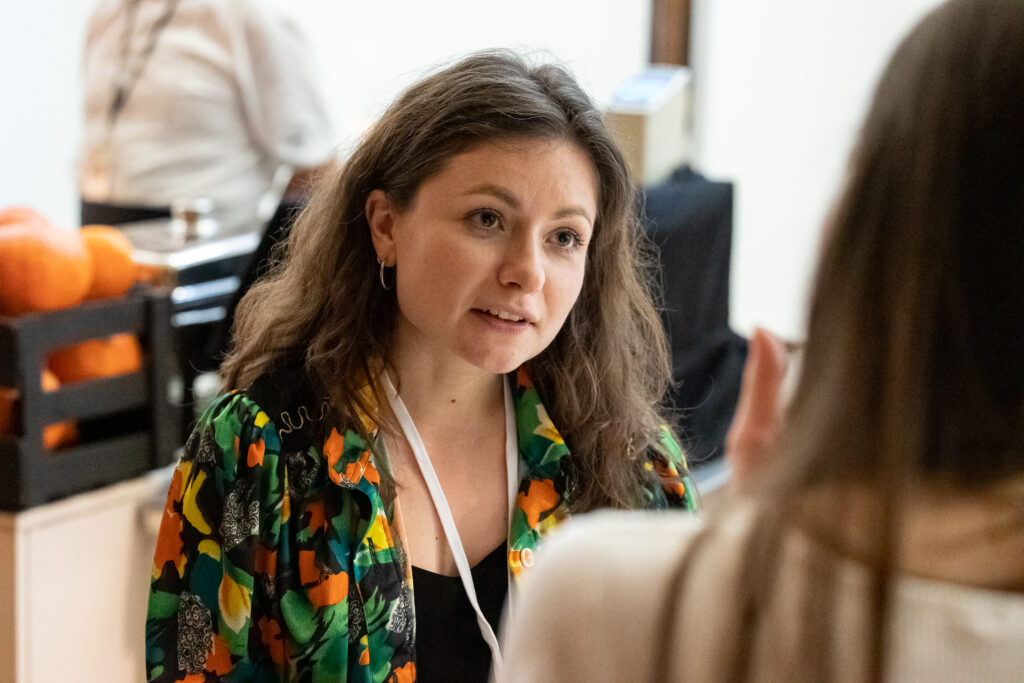“Not investing in women doesn’t make sense at all – not from a pragmatic point of view, not from an economic standpoint, and not from a development perspective. We need their voices, knowledge, and power to fight for and live in healthier, wealthier, and more peaceful societies.”
Alina Cebotari is a young women’s rights activist from Chișinău, Moldova, where she’s currently the head of Women for Women, a feminist civil society organization supported by the United Nations Women’s Peace and Humanitarian Fund (WPHF) that is advancing the financial autonomy of women and girls across the country.
“We women are raised to be very open and empathetic to other people’s experiences, which results in entire communities trusting us and relying on us to act as peacebuilders and first responders whenever conflict erupts.”
Alina and Women for Women, like thousands of women activists and their organizations, were among the first to respond to the devastating humanitarian crisis unleashed by Russia’s full-scale invasion of Ukraine in February 2022. In the early days of the conflict, they focused their efforts on addressing the urgent needs of refugees, especially women and girls, fleeing the war into Moldova, which soon became the epicenter of the refugee crisis. However, it soon became clear that other types of support, including psychosocial assistance and economic recovery programs, were needed to promote the integration of women and girls into their new communities.
Made possible through a contribution by Germany’s Federal Ministry of Economic Cooperation and Development (BMZ), WPHF – in partnership with UN Women Moldova – is supporting Women for Women on a project to improve the socio-economic recovery and civic participation of women and girls, especially Ukrainian refugee living in Moldova after the war. In addition to creating safe spaces where they can share their experiences and heal together, Alina and her colleagues are organizing mentoring sessions, vocational trainings, and interactive capacity-building activities to help them launch their own economic initiatives and small businesses, strengthening their entrepreneurship and allowing them to become financially independent.
“When women are girls depend on their partners, husbands or fathers, they are vulnerable. Only when they achieve economic independence can they be truly free – free from violence, free from harmful stigmas, and free from situations that prevent them from living to their full potential.”
Through her work with refugee women and girls on the front lines of the Ukraine war, Alina has witnessed first-hand how critical the work of women’s organizations is during conflicts and humanitarian crises. As breadwinners, community leaders, local mediators and first responders, they are a force for change in their communities, mobilizing to reach the most vulnerable and ensure their urgent humanitarian and protection needs are prioritized.
It is these women peacebuilders, humanitarians and human rights defenders – bold, empowered, and ready to take matters into their own hands – who give Alina the strength, energy and confidence to continue her work at the forefront of Europe’s largest displacement crisis in decades.
“Peace cannot be sustained without women. We know what the needs of the most vulnerable are because we ourselves are discriminated, marginalized, and abused in many different contexts. That’s our strength, and that’s how we drive change in our local realities.”
Having witnessed the impact of local women’s organizations since the first day of Russia’s war on Ukraine, Alina firmly believes that real, lasting change can only be achieved from the bottom up, giving agency and resources to grassroots activists and raising their voices so they can voice their needs and inform those at the highest levels of decision-making.
